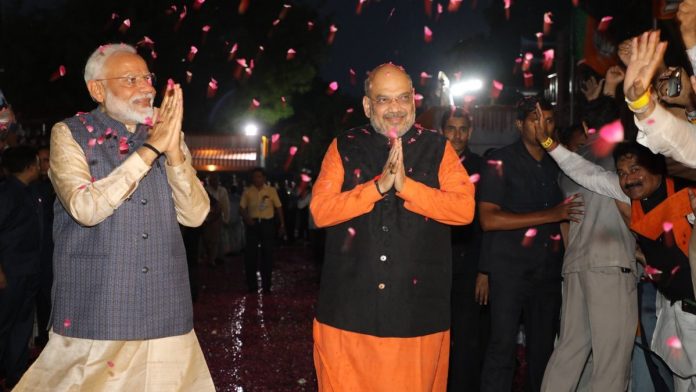The elections are not rigged as in, say, Russia. Yet the country’s ruling People’s Action Party has been in power continuously since 1959.Earlier this month, the party won 61 per cent of the popular vote in the general election. The major opposition party won just 10 of 93 seats. By any standards, this was a sweep. But for Prime Minister Lee Hsien Loong’s People’s Action Party (PAP), it is one of its worst performances ever.
Founded by Lee Kuan Yew, the PAP perfected a unique model in power where elections are free but not fair. The election commission is not independent, it is controlled by the government. Parties are given very few days to campaign.
The media in Singapore is free, but controlled by the government. It is a little critical, but ultimately pro-government, and self-censorship is common. They don’t rock the boat in the way that, for instance, the Indian media did for UPA-2 between 2011 and 2013. The latest onslaught on free speech in Singapore is a stringent fake news law — the government decides what is fake news and what is not.
Singapore is a multiparty democracy but historically, whenever opposition leaders have been electoral threats to the PAP, they have faced cases and arrests. When constituencies are redrawn, the process favours the PAP. The electoral system, neutral in theory, is designed to help the PAP, with its influence over courts and media, frequent litigation against opponents, vastly greater financial muscle than opponents, and so on.
This setup sounds a lot like the India of 2020. Like Singapore, India has free elections, but we are not sure if they can be called fair anymore. In democracy and freedom indices, India has been falling, coming closer to Singapore. The Economist’s democracy index lists both India and Singapore in a group of countries it describes as “flawed democracies”.
Media, courts, election commission, tax agencies, bureaucracy — all these institutions favour the Indian government in a way that has not happened since Indira Gandhi’s time. The ‘Singapore model’ has been called benevolent dictatorship, “authoritarianism with democracy,” a “hybrid system”. Singapore is not China, but it is not the United States either.
Learning the wrong lesson from Lee Kuan Yew
The Singapore model was established by the late Lee Kuan Yew, who was the city-state’s first prime minister, and Narendra Modi has been known to be his fan. But PM Modi has so far been successful only in copying the bad parts of the Singapore model — making elections irrelevant. Modi hasn’t been able to deliver Singapore-like economic growth, productivity, efficiency, opportunities or even cleanliness.
Many Indians, especially middle-class Indians, have long aspired for a ‘strong leader’ like Lee Kuan Yew to turn India into Singapore. But it turns out that our own wannabe ‘Lee Kuan Yew’ has done away with whatever economic growth we had. Perhaps, he sees the India of 2020 as the Singapore of 1959. The messy business of democracy has to be fully tamed before India can begin to prosper.
As part of this taming of democracy, making elections irrelevant is key. The Bharatiya Janata Party’s (BJP) domination of all independent and constitutional institutions ensures the party wins even when people are disenchanted with it.
Yet, if an opposition party does win a state election, no problem, the MLAs can be wooed and bought over, and a BJP government established. In this way, the BJP wins even when it loses. Defeat is also victory. When people are voting for the Congress, they are still voting for the BJP, because the elected Congress MLA will soon switch over to the BJP for a few suitcases and a ministerial birth.Which is why it is time to stop taking Indian elections seriously. They’re now as meaningless as the Indian government’s data, always fudged to make a bad situation look good.
Ornamental elections
As in Singapore, Indian elections now serve the purpose of giving regular legitimacy, endorsement and feedback to the party that has already chosen itself for the people. So, the biggest economic blunder in post-liberalisation India, namely demonetisation, was legitimised by the BJP’s election victory in Uttar Pradesh in 2017. Similarly, Modi’s mismanagement of the coronavirus pandemic and a poorly planned lockdown that gave immense pain to millions of migrant labourers, will be legitimised by a BJP-JD(U) election victory in Bihar. Even if holding an election amid a pandemic is a bad idea.
Weakened by endless tax raids, the Tejashwi Yadav-led Rashtriya Janata Dal (RJD) is not even trying to win the election in Bihar, lest the raids begin again. In the unlikely event that the people of Bihar are misled into making the opposition win, no problem. “Operation Kamal” will be launched and MLAs ‘wooed’. The Governor’s office is anyway an extension of the BJP office. If need be, the President of India can be woken up at 5 am.
Poaching MLAs, buying them with suitcases full of cash, hoarding MLAs in resorts — this was common practice in Indian politics. However, thanks to an anti-defection law, toppling elected governments was on a decline. The anti-defection law requires two-third MLAs to switch for a legal defection, otherwise, the defecting MLAs are disqualified. The ‘chosen’ party for India has found a way around this. MLAs don’t defect, they resign. By-polls are held and the BJP wins. That’s what happened in Karnataka, that’s what is going to happen in Madhya Pradesh, and that is what the BJP was allegedly trying to do in Rajasthan.
The law is an ass
The Sachin Pilot camp, the latest catch for the BJP, was caught ‘red-handed’ on tape allegedly participating in “Operation Kamal”. Before he could collect the 30 MLAs needed to topple his own, he was outfoxed by Chief Minister Ashok Gehlot. The assembly speaker has issued him and his fellow rebel MLAs a disqualification notice. If they get disqualified, the majority mark in the assembly falls, and Ashok Gehlot would have it easy in the floor test. But if they are not disqualified, they would defect on the floor of the House, the government could fall, and then their disqualification wouldn’t matter.
As a result, Pilot and his friends have filed a case in the Rajasthan High Court. Since a mere notice cannot be challenged, they have challenged the anti-defection law itself. If a BJP government cannot be installed despite skulduggery, the law needs to be changed. This might even be a good reason to call Parliament again despite the fear of Covid-19.
In 2016, the Modi government imposed President’s rule in Uttarakhand. However, the Uttarakhand High Court found it illegal and restored the Congress government. The judge who gave the verdict was up for promotion to the Supreme Court. The Modi government did its best to stall the elevation, though it did eventually happen. When the government is seen to be hostile to judges who give unfavourable judgments, and when former chief justices become Rajya Sabha MPs soon after retirement, one wonders if even the judiciary can save democracy.


























































































